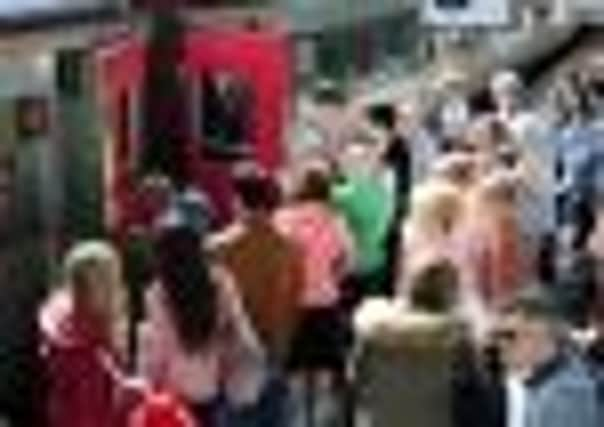The Great Train Robbery: Anger at soaring rail fares in region


Yesterday’s surprise inflation rate jump left rail users nationwide bracing themselves for a 6.2 per cent increase in average fares at the start of 2013.
But, under the terms of a funding agreement for extra carriages, ticket prices in West Yorkshire are set to increase even more – by an average of 8.2 per cent.
Advertisement
Hide AdAdvertisement
Hide AdThe Campaign for Better Transport (CBT) estimates an annual season ticket for journeys between Leeds and Huddersfield will cost more than £1,200 next year.


Its projected price for an annual season ticket between Leeds and Hull, meanwhile, is just under £4,000.
CBT chief executive Stephen Joseph described the increases as “untenable”, and claimed fares would rise three times faster than salaries during 2013.
One union leader condemned the proposed increases as “little more than daylight robbery”.
Advertisement
Hide AdAdvertisement
Hide AdThe retail price index (RPI) inflation measure for July is used to determine how much regulated fares such as season and saver tickets can be increased next year.
Yesterday the Office for National Statistics announced RPI had risen to 3.2 per cent from 2.8 per cent in June.
The City had expected the rate to remain flat at 2.8 per cent.
Average rail fare increases across England are calculated by adding three per cent to RPI.
Advertisement
Hide AdAdvertisement
Hide AdThe formula for tickets bought in West Yorkshire, however, is RPI plus five per cent.
That anomaly stems from a higher cap on fares that helped pay for the leasing of extra carriages to ease overcrowding on busy local rail routes.
The deal was struck in 2006 between parties that included West Yorkshire passenger transport authority Metro and the now-defunct regional development agency Yorkshire Forward.
Metro held fruitless discussions with the Department for Transport last year to try to find a way to ease the continuing impact of the deal on passengers.
Advertisement
Hide AdAdvertisement
Hide AdA spokesman for the transport authority said yesterday he did not expect to see any immediate change in the “RPI plus five per cent” formula for tickets for West Yorkshire travel.
Although fares for 2013 will be calculated using July’s RPI figure, the exact amounts that will be charged by each train operating company are not expected to be announced until December.
Yesterday’s RPI figure came as the Transport Salaried Staffs Association (TSSA) joined other unions, transport campaigners and rail passenger groups for a day of railway station protests against fare rises and service cuts.
Unions say as many as 20,000 rail industry jobs are at risk under the cost-cutting proposals.
Advertisement
Hide AdAdvertisement
Hide AdTSSA leader Manuel Cortes said: “It is complete nonsense to say fares have to rise above inflation every year to pay for new rail projects.
“Air travellers don’t pay higher taxes to get new runways built, and motorists certainly don’t pay more for new roads.
“This is all about squeezing a captive audience, the commuter, until the pips squeak.
“It is little more than daylight robbery.”
Michael Roberts, chief executive of the Association of Train Operating Companies, said: “The Government decides the average increase of commuter ticket prices and other regulated fares which train companies will be required to introduce in January 2013.
Advertisement
Hide AdAdvertisement
Hide Ad“It has been Government policy during the past eight years for passengers to pay a larger share of the cost of operating the railways and to focus taxpayers’ money on investing in longer term improvements to the network.
He added: “Any flexibility train companies have within the rules is to maximise revenue for the Government.”
Rail Minister Theresa Villiers said: “We are determined to drive down the cost of running the railways so we can put an end to above inflation fare increases in the future.
“Our reforms aim to deliver £3.5bn in efficiency savings while continuing to expand services.
Advertisement
Hide AdAdvertisement
Hide Ad“That is the most effective way to respond to passenger concerns about fare levels.
“We are pressing ahead with a massive programme of rail improvements to tackle crowding and improve services and rail fares are making an important contribution to delivering this at a time when taxpayer funds are limited by the pressing need to tackle the deficit.”